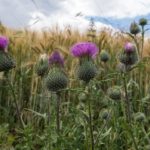What is Cottage Food?
Have you ever wondered if you could turn your hobby for making jellies, jams or cakes into a business? While most food items sold in Colorado must be prepared in a commercial kitchen with a food manufactures license, a number of home chefs are selling their creations under the Colorado Cottage Foods Act. The Colorado Cottage Foods Act allows limited types of non-potentially hazardous food products to be sold directly to consumers in Colorado without licensing or inspection.
The Colorado Cottage Foods Act was enacted in March 2012. Under it, producers can sell pickled fruits and vegetables with a finished equilibrium pH of 4.6 or below, spices, teas, dehydrated produce, nuts, seeds, honey, jams, jellies, preserves, fruit butter, flour, and baked goods, including candies, fruit empanadas, tortillas and other similar products that do not require refrigeration for safety. In addition, producers can sell up to 250 dozen whole eggs per month. Other items that must be refrigerated — salsas, barbecue sauces, cheeses, cream pies and pastries stuffed with cream cheese or custard — are not considered cottage foods and must be prepared in commercial kitchens. So must products containing any meat, including jerky. To produce these non-eligible food products requires registration with the County Health Department as a food manufacturer and site inspection.
If you would like to create an eligible food item in your home or a commercial kitchen to share with your community, the state requires food safety training. Local food vendors (and those that just want to learn more about food safety) can meet the three-year food safety certificate training requirement through a course provided by Colorado State University Extension.
Colorado Cottage Foods Act
In 2012, the Colorado Legislature enacted Senate Bill 12-048 allowing individuals to produce, sell and store certain types of “cottage food” products in an unlicensed home kitchen. The Colorado Cottage Foods Act allows individuals to make and sell a limited range of foods that are non-potentially hazardous and that do not require refrigeration. These foods are limited to spices, teas, dehydrated produce, nuts, seeds, honey, jams, jellies, preserves, fruit butter, flour, and baked goods, including candies, fruit empanadas, and tortillas.
The Colorado Cottage Food Act requires “a producer must take a food safety course that includes basic food handling training and is comparable to, or is a course given by, the Colorado state university extension service or a state, county, or district public health agency, and must maintain a status of good standing in accordance with the course requirements, including attending any additional classes if necessary.” Learn More
Colorado Cottage Foods Product Information Sheets
Jams, Jellies, Preserves and Fruit Butters
Trainings
Register here: CSU Extension Cottage Foods Events | Eventbrite



